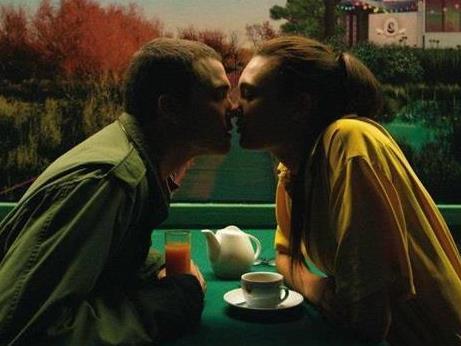Of all the explicit, unsimulated sexual acts seen in the latest film from ostensible enfant terrible Gaspar Noé, masturbation doesn’t feature. With a title such as Love, that the writer/director is looking at the physical bond between two romantically entangled people is obvious; with the lead character also an aspiring filmmaker, Noé’s debut feature I Stand Alone visible on his selves, a model from Enter the Void present in his bedroom, the protagonist mentioning his love of the name Gaspar, and Noé himself appearing on screen, it is also apparent that the feature is an act of self gratification.
Murphy may be played by Karl Glusman (Ratter), and traverse a slim narrative revolving around his affairs of the heart and couplings of the body, but there’s never any doubt that the American in Paris is Noé’s screen surrogate. Indeed, his tale — waking on New Year’s Day to a call from his ex-girlfriend’s mother, then moping around the apartment he shares with his current partner Omi (debutant Klara Kristin) and infant son Gaspar as he wallows in the fragments of memories and fantasies of the woman, Electra (fellow first-timer Aomi Muyock), he deems the true love of his life — is sketched out to prove a point that Noé has Murphy vocalise during a discussion about cinema. The latter advises that he wants to create “a movie that truly depicts sentimental sexuality”; the former is clearly attempting to do just that in his usual purposefully provocative manner.
So it is that Noé works through his issues with copulation and connection on screen, including ample evidence of how the act should be conveyed: that is, showing intercourse and love as one and the same. Putting his 3D money shots — and the fondling, thrusting, pumping and grinding that precedes them — where his mouth is, he illustrates his argument graphically, stylishly and repetitively. Letting the camera linger, often hovering above Glusman, Muyock and Kristin in flagrante and expertly choreographed, he waits and asks the audience to watch as the full fun is made plain. This is what real intimacy should look like, Noé and Murphy tell the viewer, with the variety of situations depicted speaking to the characters’ fondness for experimentation and allowing for changes in pace.
Indeed, Love demonstrates a penchant for lusty, lengthy, glowing and gratuitous penetration, and not much else. Whether slipping between the sheets in the more traditional fashion or dallying with others in a strobe-lit den dedicated to pleasure, depictions of carnality remain as rhythmic as they are repeated, with the melodrama between the scenes routine and uninvolving. That the story, non-linear and sex-filled as it may be, recounts the usual, shallow, oft-seen youthful romance spiralling into dysfunction and regret scenario doesn’t help matters, nor does a grating, unconvincingly introspective inner monologue made more so by the bland tones and blank stares Glusman garnishes it with. The latter is symptomatic of thin characters and unenergetic performances everywhere outside the bedroom or its surrogate, the boldness the central trio show in their physicality missing in their other interactions.
Accordingly, an evident passion project in several senses of the word perhaps suffers from just that, the feverish thirst at the heart of the movie outstripping all that surrounds it, and eventually over-used to the point of numbing the audience. Just as Murphy is best at expressing the titular emotion with his body, Noé succeeds in making the case for better erotica in film by merging the sensitive, sensual, primal and commonplace in consummation, even if others have done so before; neither do themselves or Love any favours when they’re simply talking about it. Whereas the protagonist has little else other than desire to define him, the filmmaker has his usual aesthetic flair — tracking walk-and-talk shots captured by his regular cinematographer, Benoit Debie (Lost River); CGI flourishes getting as down and dirty with engorged and internal body parts as can be; a soundtrack wielded with minimum subtlety but maximum impact — though once more, he seems to be simply fulfilling his own urges. Love just can’t shake its indulgence, and suffers from the problem inherent in cinematic self-pleasure: like its fleshy equivalent, it’s more fun to participate in than it is to watch.
Rating: 2.5 stars out of 5
Love
Director: Gaspar Noé
France / Belgium, 2015, 134 mins
Melbourne International Film Festival
http://miff.com.au/
30 July – 16 August
Actors:
Director:
Format:
Country:
Release:





